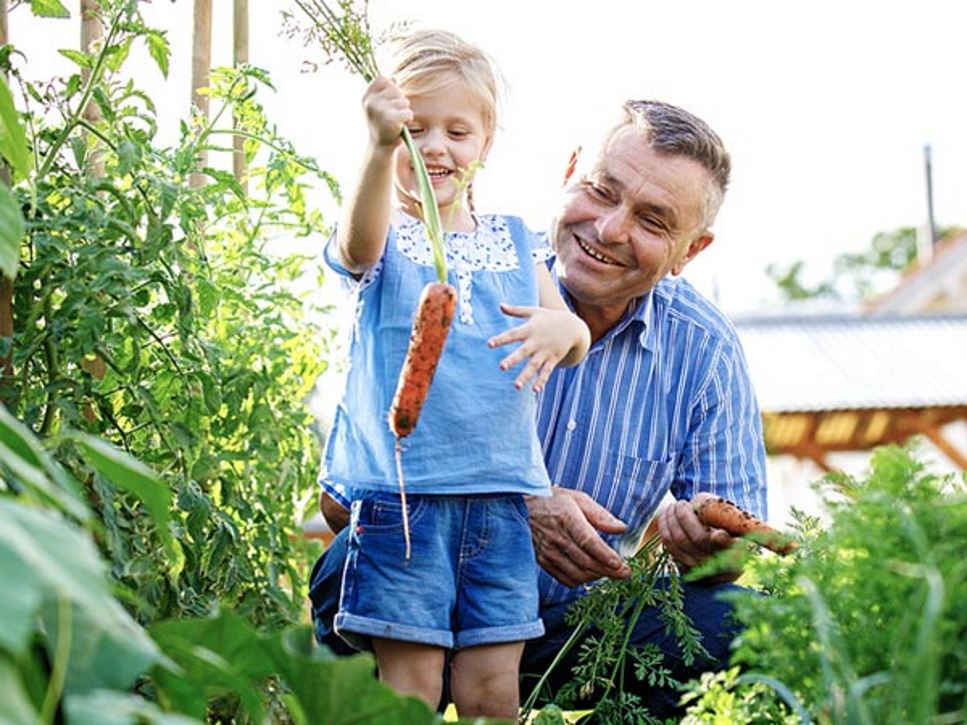An expanding body of research shows that when kids help grow fruits and vegetables, they are more likely to eat more produce and try different kinds, too.
The benefits of gardening don't end there. Gardening helps kids engage their curiosity, learn to be resourceful and gain self-confidence. It also is a great way to get the entire family outside for fresh air and physical activity.
Get started on easy foods to grow in the garden with these tips.
Make Kids Part of the Planting and Growing Process
Depending on their age, children take to gardening differently. For example, preschoolers tend to be fascinated with exploring dirt, digging holes, planting seeds and working the garden hose, while older children may be more interested in how a single seed turns into an edible plant. Older kids can read seed packets and start to understand growing regions, while younger kids may not understand that it's probably not possible to grow oranges in northern Maine. Suggest fun, reliable plants such as purple carrots and striped beets, and make sure you plant a couple of sure bets for your region. Ask children which fruits and vegetables they would like to grow. Teach children responsibility by assigning each child a watering, harvesting or weeding task. Allowing children to be involved in every step of the process will get them excited to taste the fruits (and vegetables) of their labor.
Encourage Taste Testing
Gardening exposes kids to a variety of fruits and vegetables, so encourage taste testing straight from the ground (after a quick rinse to remove dirt) and at the dinner table. Show kids how a tomato can taste delicious from the vine or in dishes such as fresh salsa, marinara sauce or tomato soup to bring the experience full circle.
Grow Herbs
Perhaps the easiest plants to grow, herbs can be a good place to start to interest kids in gardening. Herbs usually grow easily, so you'll probably have more than enough. Choose a few herbs to start, such as parsley, basil or rosemary. Don't worry if you have too much by summer's end. An excess of basil can be made into pesto, frozen in ice cube trays and stored in the freezer to use during the fall and winter. And, all herbs can be dried.
Start Small with Quick-Growing Plants
Create a garden with a dinner salad in mind. Plant salad greens, carrots, tomatoes and cucumbers — all are kid-friendly and easy to grow. Kids like to see the result of their effort, so consider planting crops that grow quickly such as green beans or those that produce heavily such as grape tomatoes. Sunflowers are another fun addition to the garden. They grow quickly and can be dried for the seeds.
Dig What Grows Below Ground
Harvesting roots and tubers can be a treasure hunt. What's more fun for a kid than yanking a carrot out of the ground, washing it and taking a bite? Beets, another "underground" crop, are colorful and can be a great way to get a child to try a new vegetable. Potatoes also are easy to grow and are kid favorites.
Gardening in Small Spaces
No yard? No problem! Try using large pots placed on the patio or porch to grow foods such as tomatoes, salad greens and even cucumbers. Most herbs can grow in small pots on indoor windowsills.
Take Gardening to the Extreme
Children are fascinated by both very small and very large objects — including vegetables. Whether in the ground or pot, cherry tomato plants grow to the perfect height for little hands to pick right off the vine. Small kids may find it exciting to watch how low-maintenance, easy-to-grow and brightly colored butternut squash and pumpkins grow and expand during the season.
Enjoy a Year-Round Harvest
The gardening experience doesn't have to end with the last outdoor harvest. Make growing edible fruits and vegetables a year-round activity. Look at seed catalogs during the cold winter months with your kids and decide what to plant next spring. Buy an indoor grow light and get started on those tomato, bean and squash plants in early spring. Kids will be fascinated by the growing process, whether it's indoors or outside.
No matter what you plant and whether your carrots look like carrots or something different, have fun. Odds are kids and parents alike will enjoy the time they spend together and learn a little something along the way. And remember: kids are going to get dirty; that's part of the fun!
Find a Nutrition Expert
Looking for credible nutrition information and recommendations? The Academy of Nutrition and Dietetics' network of credentialed food and nutrition practitioners are ready to help!

